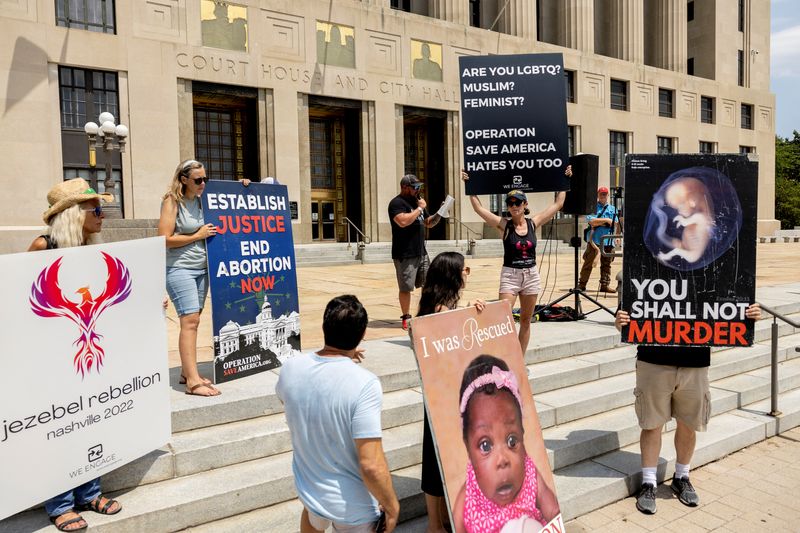By Gabriella Borter
(Reuters) - New abortion bans are taking effect in four U.S. states this week, adding to the raft of restrictions states have enforced since the U.S. Supreme Court ended the nationwide right to abortion in June.
Here is the latest on abortion access in the United States:
NEW BANS
Bans on abortion took effect on Thursday in Idaho, Texas and Tennessee. Those laws are called "trigger bans" because they were passed while Roe v. Wade, the 1973 case that established the constitutional right to abortion, was still in effect. They were designed to be triggered once the Supreme Court overturned Roe, which it did in Dobbs v Jackson Women's Health Organization in June.
All three states had already either outlawed abortion or severely limited access. The new laws include criminal penalties for abortion providers.
In Texas, abortion providers could face up to lifetime imprisonment for helping patients terminate a pregnancy. On Tuesday, a federal judge blocked the Biden administration from enforcing new guidance advising that hospitals are required under federal law to provide emergency abortions to women regardless of state bans on the procedure.
In Idaho, abortion providers can be charged with a felony and face two to five years in prison. However, a federal judge on Wednesday sided with the Biden administration and barred Idaho from enforcing the ban to the extent it conflicted with federal law requiring doctors to intervene in emergency medical situations, meaning those doctors could not be charged.
In Oklahoma, where abortion was already banned with few exceptions, a law taking effect on Thursday makes providing an abortion a felony punishable with up to 10 years in prison and a $100,000 fine.
OVERALL TALLY OF BANS
By week's end, 11 states will likely be enforcing near-total abortion bans at all stages of pregnancy: Alabama, Arkansas, Idaho, Kentucky, Louisiana, Mississippi, Missouri, Oklahoma, South Dakota, Tennessee and Texas.
PATCHWORK OF ABORTION ACCESS
An uneven and tenuous patchwork of abortion access remains elsewhere in the country. Even where abortion is still legal, courts have tightened restrictions and Republican lawmakers have pushed to further limit abortion rights.
A trigger ban was due to take effect in North Dakota on Friday, but a state court late on Thursday granted a preliminary injunction preventing its enactment and enforcement until a lawsuit filed by abortion rights advocates challenging the law is adjudicated.
The law would make it a felony to provide abortions except in cases of rape, incest or medical emergency.
In Wisconsin, abortion providers have ceased services because they are unsure whether the state's pre-Roe abortion ban can be enforced, according to the Guttmacher Institute, an abortion rights advocacy research group.
In South Carolina, abortion currently is legal up to 22 weeks of pregnancy after the state Supreme Court on Aug. 17 temporarily blocked a ban on abortions after six weeks.

A federal judge in North Carolina on Aug. 17 ruled the state could enforce a law banning abortion after 20 weeks of pregnancy, except for medical emergencies that endanger the mother's life.
Abortion is legal in Indiana up to 22 weeks. But starting on Sept. 15, it is set to be banned except in medical emergencies, or rape and incest cases prior to 10 weeks of pregnancy.